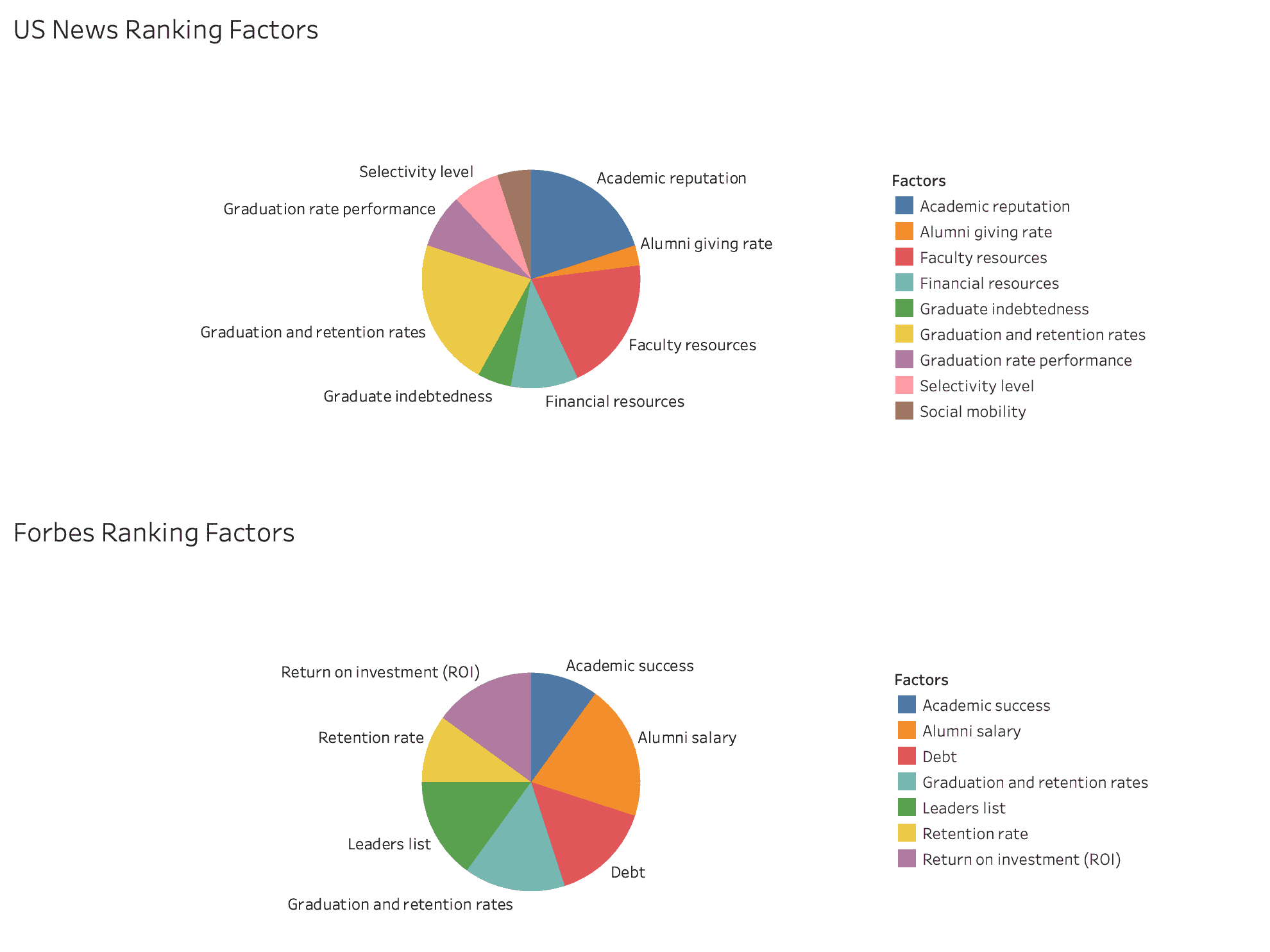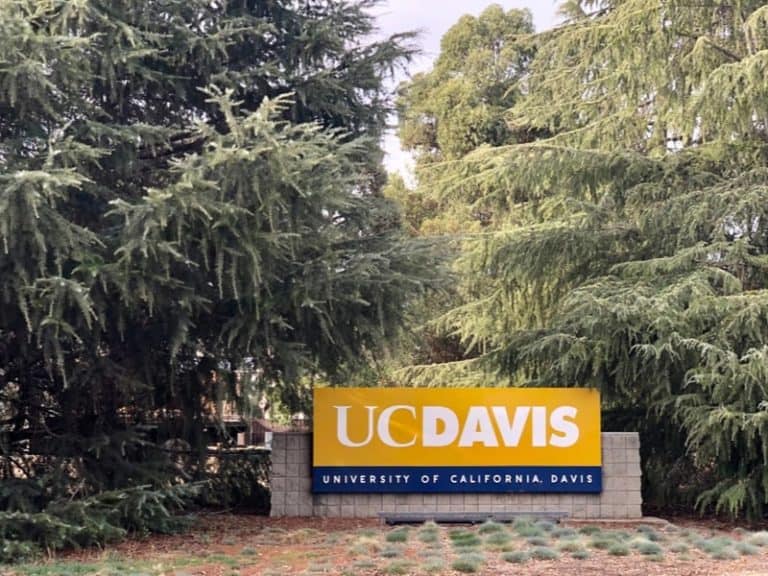US News vs. Forbes: Which College Rankings are More Accurate?
US News is popular for its yearly college rankings. Forbes, while primarily known for dishing out annual lists of the most successful, powerful and richest people, also comes up with its rankings of US colleges and universities.
So, which of them should serve as your ultimate guide to choosing an academic institution?
While US News is arguably the most popular college ranking site in the US, many high schoolers also use Forbes when building their college list. US News heavily relies on selectivity and academics when ranking institutions, while Forbes focuses more on the financial and career success of alumni members.
Can’t decide between US News and Forbes? Check out the entirety of this post!

US News and Forbes: Ranking Methodologies
Schools can jump from spot to spot across various college rankings. That’s because each college ranker relies on its own methodology, giving more emphasis on factors that it deems critical.
Due to this, college rankings can be subjective — what’s top-notch for one may be second-rate for the other.
There are 9 ranking factors US News takes into account when scoring colleges and universities. However, many of them have sub-factors.
Case in point: the faculty resources factor, which has measures such as faculty compensation, percentage of full-time faculty members, student-to-faculty ratio and class size index under it.
In obtaining data, US News obtains information from the institutions being ranked themselves. The popular college ranking site also relies on third-party sources of valuable info.
US News, unlike many college rankers, does not conduct student polls.
What it does instead is ask top academics such as presidents, provosts and deans of admissions to rate the quality of peer institutions with which they are familiar.
For its Best National Universities 2022, the college ranker sent questionnaires to a total of 4,838 academics.
However, it points out that only about 34% responded, pretty much unchanged from the previous year.
Forbes, just like US News, obtains much of the data it uses in scoring colleges and universities in the country from third-party sources. Some of them include PayScale and College Scorecard, which the college ranker turns to in determining how much money alumni members make per year on average.

It also depends on the information provided by the US Department of Education in establishing the amount of debt that graduates of a particular school owe as well as their 5-year loan repayment rates.
Annually, Forbes is known to come up with various listings of the wealthiest, the most powerful, the most influential, the richest celebrities, etc.
Well, it also relies on some of its own listings when ranking colleges based on its leaders list ranking factor. Some of them include Forbes 10 Under 30, Forbes 400 and Richest Self-Made Women.
The following table compares the ranking factors used by US News and Forbes and each one’s weighting:
| RANKING FACTORS | US NEWS | FORBES |
|---|---|---|
| Academic success | – | 10% |
| Academic reputation | 20% | – |
| Alumni giving rate | 3% | |
| Alumni salary | – | 20% |
| Debt | – | 15% |
| Faculty resources | 20% | – |
| Financial resources | 10% | – |
| Graduate indebtedness | 5% | – |
| Graduation and retention rates | 22% | 15% |
| Graduation rate performance | 8% | |
| Leaders list | – | 15% |
| Retention rate | – | 10% |
| Return on investment (ROI) | – | 15% |
| Selectivity level | 7% | – |
| Social mobility | 5% | – |
To give you an idea of how the methodologies used by US News and Forbes affect the rankings of academic institutions, you will find below a table comparing the most recent top 20 institutions of both college ranking sites.
Please take note that Best National Universities is by US News, while America’s Top Colleges List is by Forbes.
| RANKING | US NEWS | FORBES |
|---|---|---|
| #1 | Princeton University | Massachusetts Institute of Technology |
| #2 | Massachusetts Institute of Technology | Stanford University |
| #3 | Harvard University | University of California, Berkeley |
| #4 | Stanford University | Princeton University |
| #5 | Yale University | Columbia University |
| #6 | University of Chicago | University of California, Los Angeles |
| #7 | Johns Hopkins University | Williams College |
| #8 | University of Pennsylvania | Yale University |
| #9 | California Institute of Technology | Duke University |
| #10 | Duke University | University of Pennsylvania |
| #11 | Northwestern University | Northwestern University |
| #12 | Dartmouth College | Rice University |
| #13 | Brown University | Vanderbilt University |
| #14 | Vanderbilt University | Dartmouth College |
| #15 | Rice University | Harvard University |
| #16 | Washington University in St. Louis | Cornell University |
| #17 | Cornell University | University of California, San Diego |
| #18 | Columbia University | Johns Hopkins University |
| #19 | University of Notre Dame | Brown University |
| #20 | University of California, Berkeley | University of Chicago |
I highlighted the colleges present in both lists, and as you can see the lists are very similar.
MIT, Vanderbilt and Cornell, for instance, move a single spot only each. Harvard and UC Berkeley, on the other hand, move 12 and 17 spots, respectively. Although it’s interesting to point out that Northwestern doesn’t move at all.
So, Should You Use US News or Forbes?
US News and Forbes consider different factors when ranking colleges and universities. US News’ ranking factors with the most weighting are the selectivity level and academic reputation of institutions. On the other hand, Forbes’ ranking factors with the most weighting are the overall college experience and salary.
Before anything else, let’s get this matter straight: while you can use US News or Forbes as a jumping-off point in building your college list, you should not leave your choice solely on any of them.
It’s important to consider your personal needs and preferences, too, not just what either ranker deems essential.
Want to have the best possible college experience, which is vital for personal growth and enjoying more opportunities after earning an undergraduate degree? Feel free to use the college ranking of US News as a guide. Because of the employed methodology, some of its highly-ranked schools are known for their top-notch academics.
US News also values how happy and invested students are in their chosen colleges, which is why some of the pivotal indicators it uses have something to do with retention and graduation rates.
Planning on landing the highest-paying job possible and winning back your monetary investment toward a college diploma ASAP?
Using Forbes’ college ranking may be a more appropriate foundation for your college list. After all, its methodology is primarily driven by alumni success salary- and career-wise.
But just like US News, Forbes also puts emphasis on retention and graduation rates — both speak volumes about the satisfaction level of attendees toward the schools they are attending in terms of programs, support and social life.
Conclusion
US News and Forbes use various ranking factors, each one with a different weighting. US News has 9 key ranking factors, with undergraduate academic reputation and faculty resources having the most weight. Forbes, on the other hand, has 7 ranking factors, with alumni salary having the most weight.
The most recent college rankings of US News and Forbes may include pretty much the same institutions of higher education. But many of them budge from spot to spot — sometimes by a substantial amount, while other times by a small amount only. The rankings of schools heavily depend on the methodology employed.
Whether you prefer US News over Forbes or the other way around, it’s important to keep in mind that you should take college ranking — any college ranking — with a grain of salt.
Read More:
- Niche vs. US News
- US News Ranking vs. QS Ranking
- 14 Alternatives to US News Rankings
- Washington Monthly vs. US News
- Kiplinger vs. US News
Disclaimer: The views and opinions expressed in this article are those of the authors and do not necessarily represent those of the College Reality Check.





